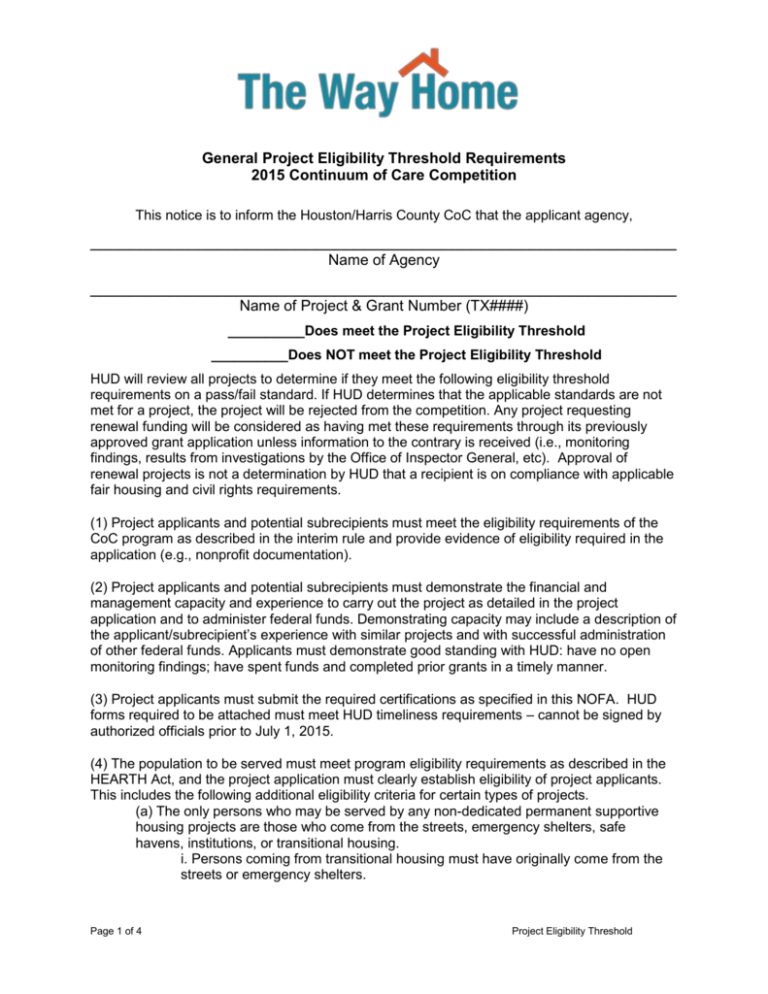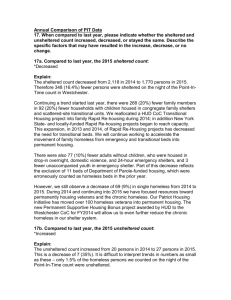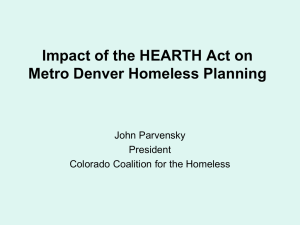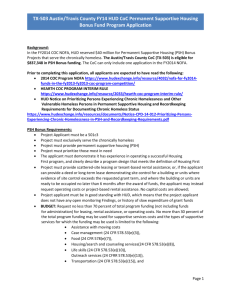2015 Project Eligibility Threshold
advertisement

General Project Eligibility Threshold Requirements 2015 Continuum of Care Competition This notice is to inform the Houston/Harris County CoC that the applicant agency, ____________________________________________________________ Name of Agency ____________________________________________________________ Name of Project & Grant Number (TX####) __________Does meet the Project Eligibility Threshold __________Does NOT meet the Project Eligibility Threshold HUD will review all projects to determine if they meet the following eligibility threshold requirements on a pass/fail standard. If HUD determines that the applicable standards are not met for a project, the project will be rejected from the competition. Any project requesting renewal funding will be considered as having met these requirements through its previously approved grant application unless information to the contrary is received (i.e., monitoring findings, results from investigations by the Office of Inspector General, etc). Approval of renewal projects is not a determination by HUD that a recipient is on compliance with applicable fair housing and civil rights requirements. (1) Project applicants and potential subrecipients must meet the eligibility requirements of the CoC program as described in the interim rule and provide evidence of eligibility required in the application (e.g., nonprofit documentation). (2) Project applicants and potential subrecipients must demonstrate the financial and management capacity and experience to carry out the project as detailed in the project application and to administer federal funds. Demonstrating capacity may include a description of the applicant/subrecipient’s experience with similar projects and with successful administration of other federal funds. Applicants must demonstrate good standing with HUD: have no open monitoring findings; have spent funds and completed prior grants in a timely manner. (3) Project applicants must submit the required certifications as specified in this NOFA. HUD forms required to be attached must meet HUD timeliness requirements – cannot be signed by authorized officials prior to July 1, 2015. (4) The population to be served must meet program eligibility requirements as described in the HEARTH Act, and the project application must clearly establish eligibility of project applicants. This includes the following additional eligibility criteria for certain types of projects. (a) The only persons who may be served by any non-dedicated permanent supportive housing projects are those who come from the streets, emergency shelters, safe havens, institutions, or transitional housing. i. Persons coming from transitional housing must have originally come from the streets or emergency shelters. Page 1 of 4 Project Eligibility Threshold ii. For any and all new projects funded through this NOFA including bonus and reallocated funding, no persons from Transitional Housing may be served iii. Homeless individuals and homeless households with children with a qualifying disability who were fleeing or attempting to flee domestic violence, dating violence, sexual assault, or stalking and are living in transitional housing are eligible for permanent supportive housing even if they did not live on the streets, emergency shelters, or safe havens prior to entry in the transitional housing. As participants leave currently operating projects, participants who meet this eligibility standard must replace them. Notwithstanding the above, no resident of transitional housing is eligible to be served by ANY new project funded through the 2014 NOFA competition. iv. Persons exiting institutions where they reside for 90 days or less and came from the streets, emergency shelter, or safe havens immediately prior to entering the institution are also eligible for permanent supportive housing. (b) The only persons who may be served by dedicated or prioritized permanent supportive housing beds are chronically homeless persons. Persons in transitional housing are NOT considered to be chronically homeless even if they met the criteria prior to entering transitional housing. (c) Rapid rehousing projects originally funded to serve individuals and families coming from the streets and emergency shelters must continue to do so. Persons coming from transitional housing are not eligible. (d) New rapid rehousing projects created through reallocation must serving households with children coming from the streets and emergency shelters and may include in part or whole, victims of domestic violence; however these persons must meet all other criteria for this type of housing. Persons coming from transitional housing are not eligible. Please see The Way Home CoC project prioritizations for additional information. (e) Projects originally funded as part of the FY 2008 Rapid Re-Housing for Families Demonstration must continue to adhere to the following requirements: i. Must serve households with dependent children residing on the streets or emergency shelters. ii. No more than 30 percent of the total eligible program activities may be used for supportive services, including case management. iii. Eligible supportive services are limited to housing placement, case management, legal assistance, literacy training, job training, mental health services, childcare services, and substance abuse services. iv. Eligible housing activities include leasing only. v. Continue to participate in and provide requested information to HUD for evaluation. Page 2 of 4 Project Eligibility Threshold (f) Renewal projects originally funded under the Samaritan Housing Initiative must continue to exclusively serve 100 percent chronically homeless, unless there are no chronically homeless within the CoC geographic area. CoCs should not hold units vacant, but instead should prioritize other vulnerable and eligible households. (g) Renewal projects originally funded under the Permanent Housing Bonus must continue to serve the homeless population in accordance with the respective NOFA under which it was originally awarded. (h) Transitional housing and supportive services only projects may be eligible to use up to 10 percent of the total CoC funds to serve the homeless as defined by other federal definitions. However, the CoC must be approved by HUD during the competition to serve the homeless as defined by other federal homeless definitions. No project may serve this population unless HUD approves the CoC during the competition. Section II.B.12 of this NOFA describes the process for gaining HUD approval to serve the homeless as defined under other federal definitions. No projects in the 2015 NOFA competition may apply to serve persons defined as homeless by other federal definitions. (i) Renewal projects that indicated that they would prioritize chronically homeless persons in beds that become available through turnover in non-dedicated permanent supportive housing projects must continue to do so. (5) The project must be cost-effective, including costs of construction, operations, and supportive services with such costs not deviating substantially from the norm in that locale for the type of structure or kind of activity. (6) Project applicants, except Collaborative Applicants that only receive awards for CoC planning costs and, if applicable, UFA costs, must agree to participate in a local HMIS system. However, in accordance with Section 407 of the Act, any victim service provider that is a recipient or subrecipient cannot disclose, for purposes of HMIS, any personally identifying information about any client. Victim service providers must use a comparable database that meets the needs of the local HMIS. (7) Whether project applicants administer their programs or activities in the most integrated setting appropriate to the needs of qualified homeless with disabilities. This means that programs or activities must be offered in a setting that enables the homeless with disabilities to interact with others without disabilities to the fullest extent possible. Print Name of Agency Board of Directors Approved Signatory: Signature of Agency Board of Directors Approved Signatory: Title: Date: Page 3 of 4 Project Eligibility Threshold Page 4 of 4 Project Eligibility Threshold








